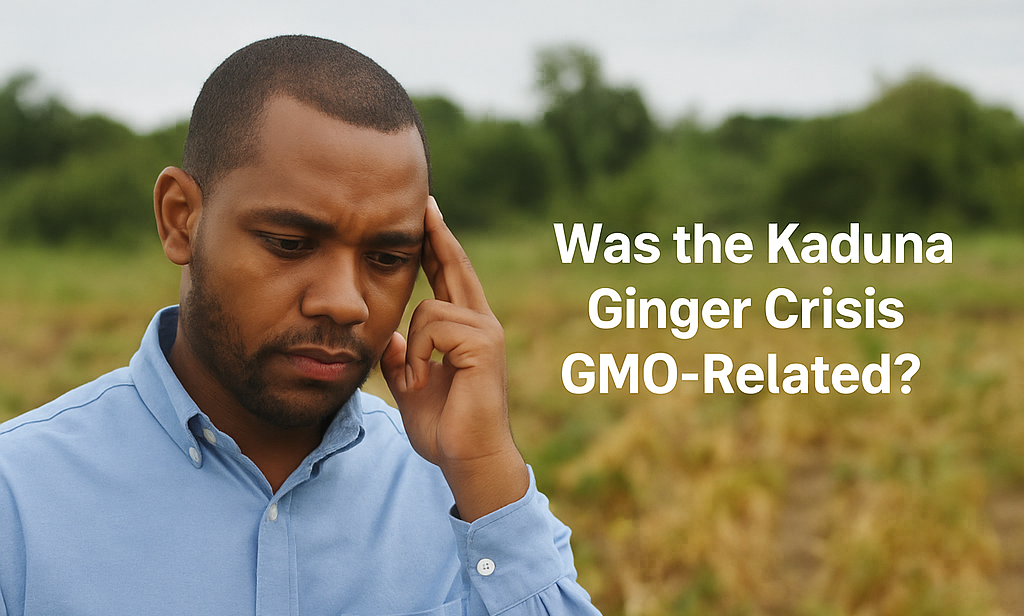The Ginger Crisis in Kaduna: Beyond Accusations, Towards Evidence and reality!
A deeper dive into the challenges of one sided under researched rhetoric's on the ginger crisis that raved the ginger industry in Nigeria. A response to the widely publicized views projecting Ginger production challenged caused by GMOs
Lawal Abdulrahman Temitope


The recent discussions on Kaduna’s ginger crisis highlight a painful reality: a once-thriving industry has been brought to its knees. Farmers, traders, and entire communities have been caught in a shock wave of scarcity in ginger production. This has created lots of postulations ranging from deliberate sabotage to misguided aid to GMOs. In the heat of public debate, several allegations have been put forward as the causes of this tragedy, such as:
· That Foreign aid interference in donor agencies introduced compromised or genetically modified seeds (GMOs) that weakened local resilience.
· That there was deliberate sabotage where external actors intended to collapse Nigeria’s ginger industry to create dependence on imports by introducing inputs in the guise of aid
These claims fueled anger and mistrust, particularly around the role of “aid” and the possibility of an orchestrated attack on a vital Nigerian crop. While not debunking these claims outright, it is important to objectively research, analyse and evaluate these claims if we truly want to learn from the challenges
Let’s focus on the Reality of What Happened, beyond the allegations; the reality documented by agronomists and field reports is stark:
· A fungal outbreak caused by Proxipyricularia zingiberis devastated Kaduna’s ginger farms, wiping out over 90% of the crop in some areas.
· The crisis was worsened by monocropping practices, where vast tracts of land planted continuously with ginger provided ideal breeding grounds for pathogens.
And these are other possible reasons for the outbreak
· Poor disease surveillance allowed infections to spread undetected until it was too late.
· Climate stress, unpredictable rains, flooding in some areas, and drought in others further weakened plants already stressed by soil mismanagement.
· A lack of timely research-based intervention that allowed the disease to spiral out of control, while farmers were left without guidance on mitigation.
· Excessive or inappropriate use of fertilisers,
· The invasion of new or foreign insects, pests, birds, or animals
· Poor soil management practices,
· Or indeed, some of the external influences suggested.
And other possible reasons. The reality of what this caused and the trickling effects that spiralled into our indigenous ginger scarcity are not just issues that should be reduced to one-side blame without proper research.
Claims of GMO and the Need for Caution
In the public discourse, one of the loudest claims has been that the ginger in question was genetically modified. I personally engaged in one such Instagram thread, asking the simple question: “How is this GMO?” Unfortunately, the responses I received were not only vile and insulting but also devoid of any objective reasoning.
This highlights a bigger problem: when we replace evidence with outrage, we lose the chance to find real solutions. Labeling the ginger as GMO without verifiable proof may deflect from other possible causes, and worse, it creates confusion among farmers and the public.
The truth is, the Kaduna ginger crisis could have been triggered by a combination of factors, not just one, some highlighted above, including the following here attached however, these are a few points that projects how beyond doubts, the ginger challenge has nothing to do with GMOs
Why Nigeria’s Ginger Challenges Cannot Be GMO-Related
For starters, no GMO Ginger Exists Anywhere in the World. As of today, there is no commercially released genetically modified (GMO) ginger variety in global agriculture. Unlike crops like maize, soybean, cotton, or canola, ginger has never been genetically engineered for commercial farming.
Major regulatory databases (e.g., ISAAA, USDA, and EFSA) confirm that ginger has not undergone GMO approvals anywhere. This makes it scientifically impossible for Nigeria’s ginger crisis to be caused by GMO ginger.
Secondly, the Documented Cause was a fungal pathogen. Researchers and media reports identified Proxipyricularia zingiberis (a fungal pathogen) as the cause of the outbreak in Kaduna. Fungal outbreaks are common in monocropped, poorly rotated soils, especially under humid, wet conditions.
This is an agronomic and phytopathological problem, not a genetic modification issue. The disease spread rapidly because of continuous ginger planting, inadequate disease surveillance, and poor early response.
Perhaps other Crisis Factors that are well known with Known Farming Challenges align with the more possible causes of the ginger crisis, eg:
· Excessive fertiliser and chemical use weakens soils, increasing plant susceptibility.
· Continuous monocropping builds up soil-borne pathogens.
· Climate extremes (eg, the heavy rainfall in Kaduna around 2022–23) might have created the perfect environment for fungal spread.
All these factors are well-known non-GMOs that could have caused the crops to collapse.
The Cost of Subjective Narratives
When discussions are dominated by accusations without evidence, three things happen:
The true causes remain hidden.
Farmers are left with misinformation, unable to adjust their practices.
Policy responses become reactive, shaped by emotion rather than science.
In the end, the people who suffer most are the very farmers who depend on ginger for their livelihoods.
Moving Forward: Lessons We Must Learn
Instead of polarising debates, we must turn crises into opportunities for stronger systems. Some lessons are clear:
Research first, blame later. The government, institutions, and farmer groups should commission transparent, scientific investigations whenever such crises occur.
Promote open dialogue, not Insults and hostility, as this only shuts down critical thinking. Remember, respectful debate fosters better solutions.
Local research institutes must be empowered to grow beyond the challenges
Finally, the Kaduna ginger crisis is indeed a tragedy, but also a warning. It reminds us that agriculture cannot be built on assumptions, imported fixes, or emotional reactions. We must confront challenges with objectivity, evidence, and collective responsibility. There is still much to unpack, but one truth is clear: if we want to protect our farmers and our food systems, we must replace speculation with science and hostility with dialogue.
